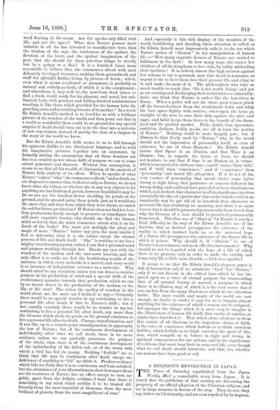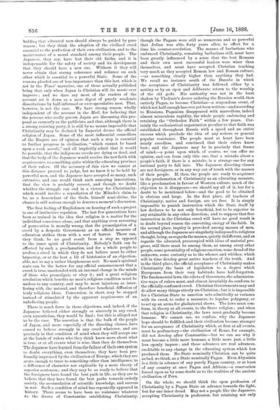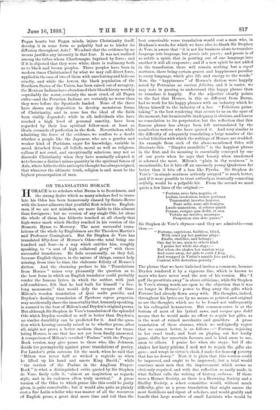A RELIGIOUS REVOLUTION IN JAPAN.
THE Times of Saturday republished from the Japan Weekly Mail a remarkable story from Japan. It is stated that the publicists of that country are discussing the propriety of an official adoption of the Christian religion, and are in large measure in favour of the step. They do not, they say, believe in Christianity, and are even repelled by its dogmas,
holding that educated men should always be guided by pure -reason ; but they think the adoption of the civilised creed essential to the perfection of their own civilisation, and to the -maintenance of a moral standard among their people. The Japanese, they say, have lost their old faiths, and it is indispensable for the safety of society and its development that they should have a new one. Without it they will never obtain that strong coherence and reliance on each -other which is essential to a powerful State. Some of the reasons pleaded are of less importance than this last, which is not in the Times' narrative, one of those actually published -being that only when Japan is Christian will its music ever improve ; and we dare say most of the readers of the -iecount set it down as a mere digest of purely academic dissertations by half-informed or over-speculative men. That, however, is not the case. We have strong reason, wholly -independent of the account in the Mail, for believing that the persons who really govern Japan are discussing this pro- posal as earnestly as the publicists, and that, although there is a strong resisting party, it is still by no means impossible that Christianity may be declared by Imperial decree the official religion of Japan. Some of the most influential councillors of the Empire are of opinion that such a step is essential to further progress in civilisation, "which cannot be based upon a weak morale," and all implicitly admit that it would lie possible, that the indigenous creeds are dying or dead, and that the body of the Japanese would receive the new faith with -acquiescence, as something quite within the educating province -of their rulers. Of the accuracy of this view we cannot at this distance pretend to judge, but we know it to be held by powerful men, and the Japanese have accepted so many, such extensive, and one would think such annoying innovations, Chat the view is probably correct, and though we doubt whether the struggle can end in a victory for Christianity, -which would involve a repudiation of the Mikado's claim to be, as a descendant of the Gods, himself semi-divine, the Chance is still serious enough to deserve a moment's discussion.
The first feeling of Englishmen on hearing of such a project is one of instinctive repulsion. The last few generations have -been so trained in the idea that religion is a matter for the ' individual conscience alone, and that anything even savouring -of persecution is morally wrong, that the promulgation of a creed by a despotic Government as an official measure of education strikes them with a sort of horror. There can, • they think, be no good result from a step so opposed to the inner spirit of Christianity. Nobody's faith can be affected by such a proclamation, and for a whole people to profess a creed in which they do not believe must be either -hypocrisy, or at the best a bit of histrionics of an objection- able, not to say a rather blasphemous sort. No man's spiritual state can be the better for any official announcement that a creed is true, unattended with an internal change in the minds of those who promulgate or obey it; and a great religious -revolution which benefits no man's religious condition must be useless to any country. and may be most injurious, as inter- fering with the natural, and therefore beneficial, diffusion of truly religious ideas. Conversion, in short, may be stopped instead of stimulated by the apparent acquiescence of an unbelieving people.
There is much force in these objections, and, indeed, if the Japanese believed either strongly or sincerely in any creed, -even agnosticism, they would be final; but this is alleged not -to be the case. The assertion is that the bulk of the people of Japan, and more especially of the directing classes, have ceased to believe strongly in any creed whatever, and are precisely in that condition of mind when they will accept one -at the hands of rulers who they think know more about what is true, or at all events what is wise, than they do themselves. "The Japanese have learned from the failure of their own system to doubt everything, even themselves ; they have been pro- foundly impressed by the civilisation of Europe, which they are acute enough to trace to something other than intelligence, to a difference of character not explicable by a mere theory of superior acuteness ; and they may be as ready to believe that the foreigners have found the best path in life, as they are to 'believe that they have found the best paths towards orderly society, the accumulation of scientific knowledge, and success -in war. Such a condition of mind has repeatedly appeared in history. There seems to have been no resistance whatever -to the decree of Constantine establishing Christianity, though the Pagans were still BO numerous and so powerful that Julian was able, forty years after, to effect for a time his counter-revolution. The masses of barbarians who embraced Christianity, remaining barbarians still, must have been greatly influenced by a sense that the best Romans and their own most successful leaders were wiser than themselves, and must have accepted Christian teaching very much as they accepted Roman law and Roman culture. —as something clearly higher than anything they had. We recall no instance south of the Danube in which the acceptance of Christianity was followed either by a mutiny or by an open and deliberate return to the worship of the old gods. His authority was not in the least shaken by Vladimir's decree ordering the Russian world, then entirely Pagan, to become Christian—a stupendous event, of which not half enough has ever yet been written—and according to Russians, Paganism disappeared with marvellous, indeed almost miraculous rapidity, the whole people embracing and retaining the "Orthodox Faith" within a few years. Cer- tainly the ecclesiastical organisation peculiar to that faith was established throughout Russia with a speed and an entire success which preclude the idea of any serious or general popular resistance. The people must at heart have been nearly creedless, and convinced that their rulers knew best; and the Japanese may be in precisely that frame of mind,—a point upon which, of course, we can offer no opinion, and can form only this one, that a mistake about a people's faith, if there is a mistake, is a strange one for any national party to fall into. The Japanese directing classes are not foreigners, or in any way out of touch with the masses of their people. If, then, the people are ready to acquiesce in the proclamation of Christianity as an educating measure, like a proclamation in favour of Western culture, much of the objection to it disappears—we should say all of it, but for a. doubt to be mentioned below—and the good to be obtained is obvious and large. In the first place, all teachers of Christianity. native and foreign, are set free. It is simply impossible to punish instruction which the State itself by law declares to be not only beneficial, but to be superior to any attainable in any other direction; and to suppose that free instruction in the Christian creed will have no good result is to doubt beyond reason the converting energy of the faith. In the second place, inquiry is provoked among masses of men, and although the Japanese are singularly indisposed to religious thought, being, as regards the masses, quietly indifferent, and as regards the educated, preoccupied with ideas of material pro- gress, still there must be among them, as among every other people, some potentiality of religious emotion, some dread of the unknown, some curiosity as to the whence and whither, which will in time develop great native teachers of the truth. And in the third place, the official acceptance of Christianity makes Christianity the basis of legislation to a degree which Europeans, from their very habitude, have half-forgotten. The fundamental laws, the edicts of Governors, the administra- tive ways of rulers must, and almost invariably do, conform to the officially confessed creed. Christian Governments may and do allow many things utterly un-Christian ; but it is impossible for a Christian State to sanction acts admittedly at variance with its creed, to order a massacre, to legalise polygamy, or to set up an arena for gladiatorial shows. The laws must con- form, in theory at all events, to the State religion ; and when that religion is Christianity, the laws must gradually become humane. We cannot see, we confess, why the Japanese hope should be fulfilled, and their civilisation become stronger for an acceptance of Christianity which, at first at all events, must be perfunctory—the civilisation of Rome, for example, did not develop after Constantine—but we can see why it must become a little more humane, a little more just, a little less openly impure ; and those advances are real advances, creditable to any change in the educating system which has produced them. No State nominally Christian can be quite as bad, we think, as a State nominally Pagan. Even Abyssinia is a little in advance of any purely Pagan country, or at least of any country at once Pagan and African,—a reservation forced upon us by some doubt as to the realities of the ancient civilisation of Peru.
On the whole, we should think the open profession of Christianity by a Pagan State an advance towards the light, but for one inner dread. May not a people like the Japanese, accepting Christianity in profession, but retaining not only Pagan hearts but Pagan minds, injure Christianity itself, develop it in some form so palpably bad as to hinder its diffusion throughout Asia P We admit that the evidence by no means justifies any intensity in that fear. It was not realised among the tribes whom Charlemagne baptised by force; and if it is objected that they were white, there is testimony both as to black and brown peoples. Three peoples have been in modern times Christianised by what we may call direct force, applied in the case of two of them with unrelenting and hideous cruelty, and while the lowest, the black population of the Southern States of the Union, has been raised out of savagery, the Mexican Indians have abandoned their bloodthirsty worship —probably the worst, certainly the most cruel, of all Pagan cults—and the Peruvian Indians are certainly no worse than they were before the Spaniards landed. None of the three have shown any disposition to develop monstrous forms of Christianity, and in none has the ideal of the faith been visibly degraded ; while in all, individuals who have reached a high level of personal sanctity, have been regarded by their less spiritual fellow-men at least as ideals, counsels of perfection in the flesh. Nevertheless, while admitting the force of the evidence, we confess to a doubt whether a people like the Japanese, who are a gentler and weaker kind of Parisians, eager for knowledge, variable in mood, detached from all beliefs, moral as well as religious, callous if not cruel, and exceptionally salacious, may not so discredit Christianity when they have nominally adopted it as to become a distinct minus quantity in the spiritual forces of Asia, where hitherto this antiseptic thought has always reigned, that whatever the ultimate truth, religion is and must be the highest preoccupation of man.




































 Previous page
Previous page